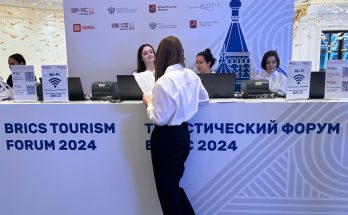
Ahead of Prime Minister Narendra Modi’s visit to Uzbekistan for the SCO summit on September 15-16, eminent diplomats and strategic experts have underlined the need for India to be more proactive in highlighting its core concerns on terrorism and Afghanistan.
Pankaj Saran, India’s former Deputy National Security Adviser, and former envoy to Russia, underscored that India should place its concerns on cross-border terror at the SCO summit. India should also raise the issue of ungoverned spaces in Afghanistan, said Mr Saran at a virtual conference on India’s role in Central Asia, organised by India Writes Network and Centre for Global India Insights (CGII), a think tank focused on global affairs.
Referring to the continuing patronage of terrorist groups such as Lashkar-e-Toiba (LeT) and Jaish-e-Mohammad (JeM) in Afghanistan by the establishment in Pakistan and Afghanistan, Mr Saran added that India should also raise the issue of ungoverned spaces in Afghanistan. Mr Saran added that that the Regional Anti-Terrorist Structure (RATS), a permanent SCO sub-grouping, has emerged as a key discussion platform on terrorist threats from Afghanistan. India is currently chairing RATS.

“Our focus should continue to be on anti-terrorism and try to make SCO as well as RATS more effective in dealing with terrorism,” said Skand Tayal, India’s former ambassador to Uzbekistan. “There are all kinds of terror organizations which have found sanctuary in Afghanistan. Terrorism is the greatest threat faced by the five Central Asian countries and the region,” he said at the online conference in which diplomats, strategic experts, businessmen and students participated in large numbers. “Central Asia is the core of Shanghai Cooperation Organisation,” said Mr Tayal. He identified terrorism and connectivity as important focus areas for India’s enhanced role in SCO.

“In Central Asia and in the framework of Shanghai Cooperation Organization also, India is a strong votary of this principle that Central Asia should be central to SCO, and whatever happens in SCO, you need to take into account the interests of Central Asia,” Manish Prabhat, India’s Ambassador to Uzbekistan, said at the virtual conference. “Central Asia is trying to now speak in one voice. There is greater emphasis on economic integration in Central Asia. India is on the right track in enhancing its engagement with the region,” said Mr Prabhat.
Manish Chand, Director, Centre for Global India Insights, underlined that India has vital national interests in intensifying engagement with SCO and Central Asian countries. ”Understanding India’s role and potential to shape the geopolitical and geoeconomic landscape is crucially important as India takes over the presidency of SCO from Uzbekistan and will host the next summit,” he said. “This is an important debate as some important voices in the strategic community have off and on expressed scepticism about India’s membership of SCO.”
Besides PM Modi, the summit will be attended by the leaders of 15 countries, including Russian President Vladimir Putin, Chinese President Xi Jinping and Pakistan’s Prime Minister Shehbaz Sharif.
Focus on Afghanistan
“Central Asian countries are also looking for options outside the region and beyond China and Russia. India can definitely be one of the important players, as far as this is concerned. It’s a win-win situation for SCO and India,” said Ashok Sajjanhar, India’s former ambassador to Kazakhstan.

In this regard, Mr Sajjanhar said that the UN Security Council resolution on Afghanistan adopted in August 2021 under India’s rotating presidency of UNSC would serve as a “template” for New Delhi. The UNSC resolution said that the territory of Afghanistan can’t be used for “sheltering, training, planning or financing terrorist acts,” in line with the Taliban’s commitment during the Doha Peace negotiations.

Stressing that bilateral differences between India and China will not impact SCO cooperation, Prof. Srikanth Kondapalli, China expert and Dean, SIS, JNU, said that SCO should promote civil society interactions, especially between media, educational institutions, think tanks, and other fora to maximise its impact in the region.

Batting for bigger role of India in the region, Dr Leila F. Delovarova, Lecturer, Al-Farabi Kazakh National University, stressed that India’s cooperation with the Central Asia countries is important in terms of geo-cultural, geoeconomic and geostrategic perspectives. “Today, India is actively represented on the regional and global platforms and has a huge potential. Both India and Central Asia are interested parties in ensuring the stability in the region and along the perimeter.”
“India has been very helpful in vaccine distribution during the COVID 19 disaster that affected the entire SCO region. SCO region was also one of the largest in terms of the number of victims and the number of those people killed,” said Mr Kondapalli.
Author Profile
- India Writes Network (www.indiawrites.org) is an emerging think tank and a media-publishing company focused on international affairs & the India Story. Centre for Global India Insights is the research arm of India Writes Network. To subscribe to India and the World, write to editor@indiawrites.org. A venture of TGII Media Private Limited, a leading media, publishing and consultancy company, IWN has carved a niche for balanced and exhaustive reporting and analysis of international affairs. Eminent personalities, politicians, diplomats, authors, strategy gurus and news-makers have contributed to India Writes Network, as also “India and the World,” a magazine focused on global affairs.
Latest entries
 In ConversationJuly 26, 2024India-Italy defence collaboration can extend to third countries: Anil Wadhwa
In ConversationJuly 26, 2024India-Italy defence collaboration can extend to third countries: Anil Wadhwa In ConversationJuly 23, 2024Italy views India as a key partner in Indo-Pacific: Vani Rao
In ConversationJuly 23, 2024Italy views India as a key partner in Indo-Pacific: Vani Rao DiplomacyJune 29, 2024First BRICS unveils a roadmap for boosting tourism among emerging economies
DiplomacyJune 29, 2024First BRICS unveils a roadmap for boosting tourism among emerging economies India and the WorldJune 11, 2024On Day 1, Jaishankar focuses on resolving standoff with China
India and the WorldJune 11, 2024On Day 1, Jaishankar focuses on resolving standoff with China








